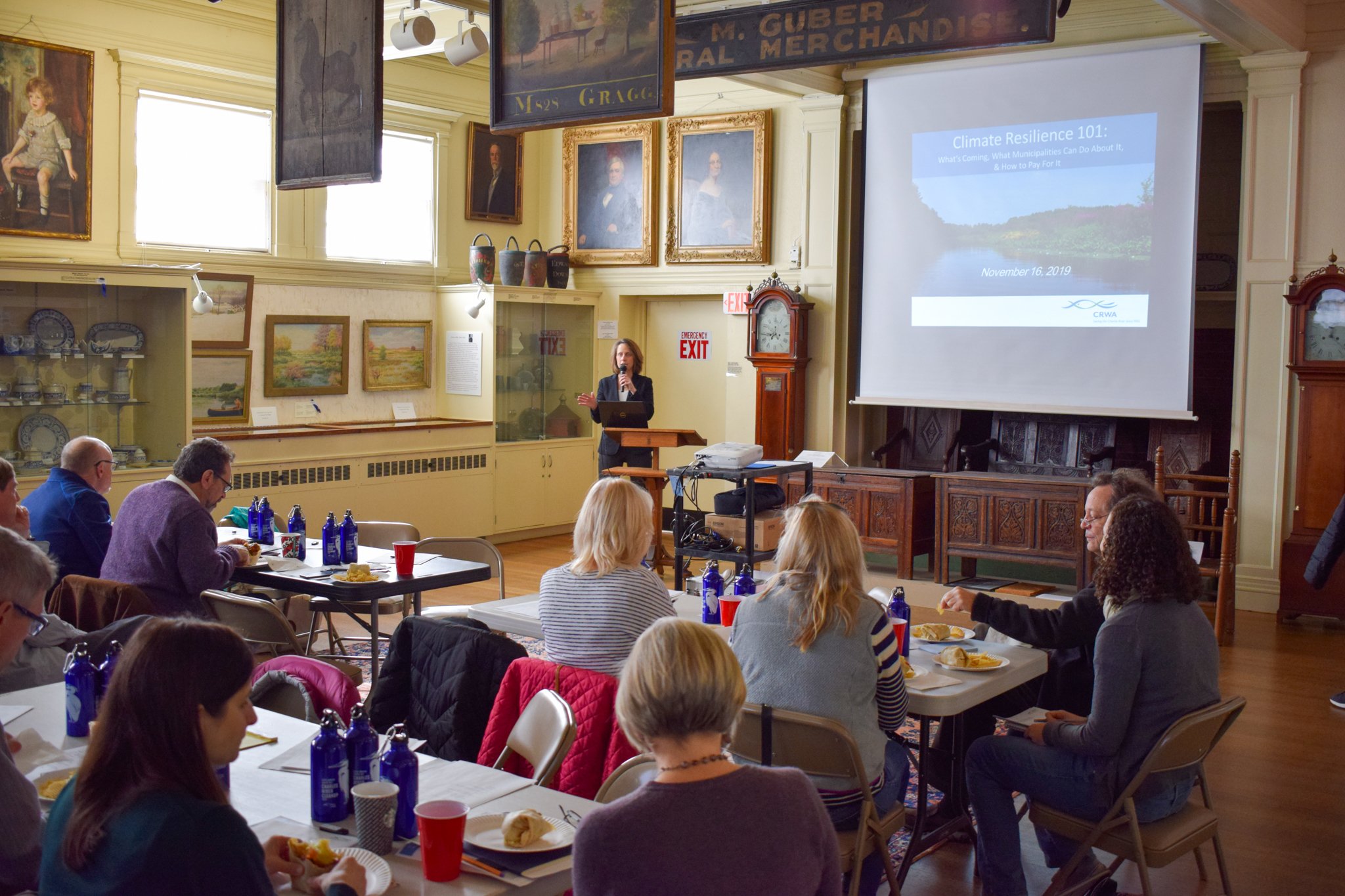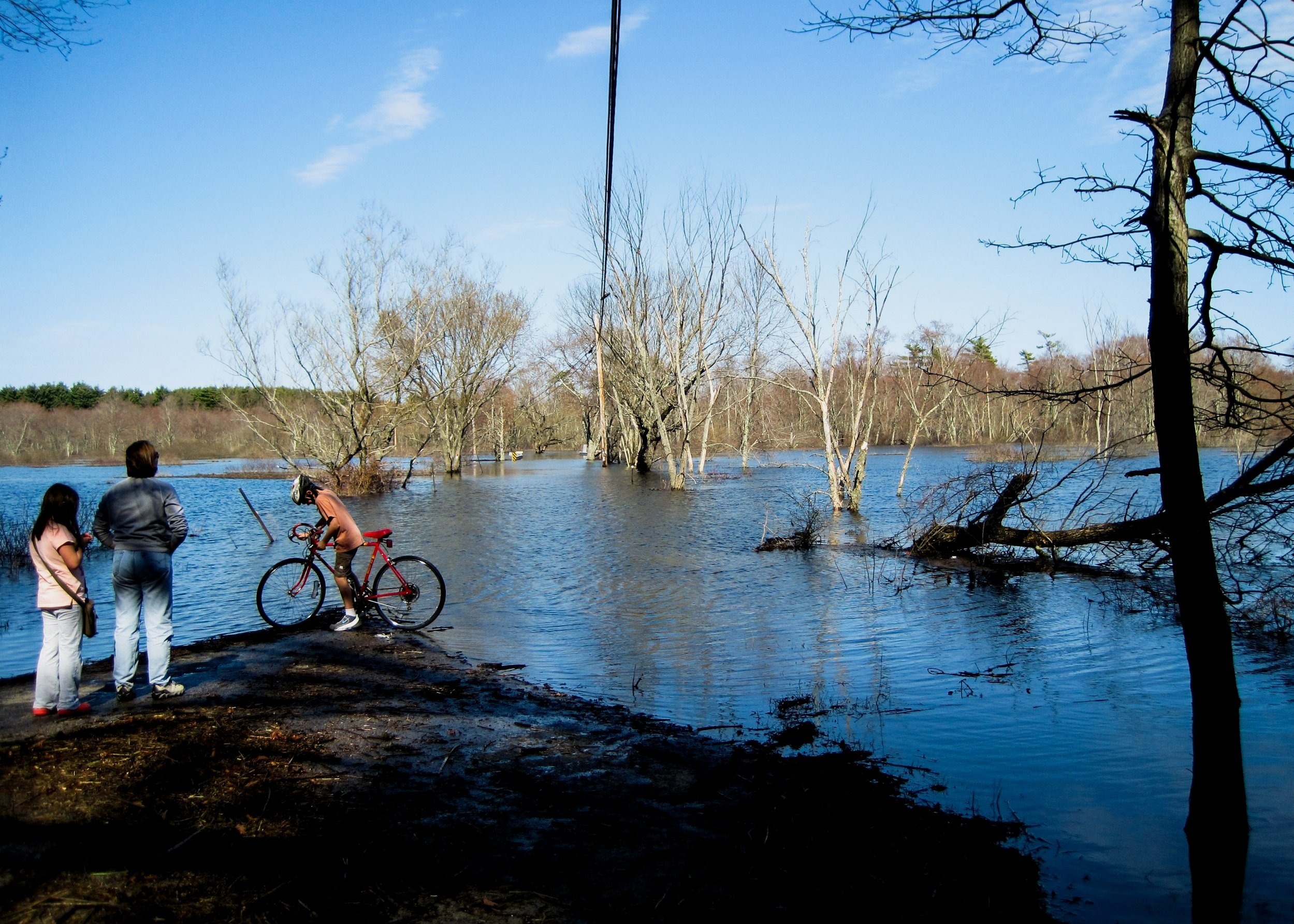
CLIMATE RESILIENCE 101
Climate Preparedness Training for Elected Officials
Training Watershed Leaders.
Local governments know to invest in firefighters to protect communities from fire. But mayors, city councilors, and select board members are often not yet prepared to respond to the climate crisis with the urgency it necessitates.
Climate impacts like flooding, drought, and extreme heat are already being felt in our watershed, yet our local leaders often lack the information they need to respond to these growing threats.
That’s where we come in––we’re educating local elected officials on how to build climate resilience with nature-based solutions, building legislative support for resilience initiatives, and accelerating climate adaptation in our watershed as a whole.
Climate Resilience 101 Toolkit:
Resources, tools, and examples to help local elected officials advance climate preparedness initiatives in their community to build resilience across the watershed.
-
Stormwater pollution is the greatest threat to a clean Charles River.
In our highly urbanized watershed, with up to 80% impervious cover in some areas, every rainstorm washes all the gasoline, trash, oil, pet waste, pharmaceuticals, and more from our roads, parking lots, and roofs straight into the Charles, untreated.
We’re keeping stormwater pollution out of our river in the first place by advocating for strong stormwater regulations, helping cities and towns meet reduction goals, and bringing nature back into the built environment with green infrastructure solutions.
LEARN MORE >>
STORMWATER MANAGEMENT BYLAWS AND REGULATIONS
U.S. EPA recommends these models as being compliant with the MS4 permit:
Model Stormwater Bylaw, Northern Middlesex Stormwater Collaborative
Model Stormwater Regulations, Northern Middlesex Stormwater Collaborative
Communities in the Charles River watershed have additional requirements under the MS4 permit to significantly reduce phosphorus pollution in stormwater discharges:
CRWA-Recommended Additions to Stormwater Bylaws re Phosphorus Reduction
CRWA-Recommended Additions to Stormwater Regulations re Phosphorus Reduction
FUNDING STORMWATER IMPROVEMENTS: STORMWATER UTILITIES
A stormwater utility raises funds to support a community’s stormwater program.
MAPC Stormwater Utility Starter Kit
Summary Chart of MA Communities with Stormwater Utilities
Town of Franklin Stormwater Utility Informational Packet
GREEN STREETS
Green streets incorporate green infrastructure into the streetscape to treat and infiltrate stormwater runoff close to its source and create more livable communities.
Green streets build upon complete street principles that focus on safety and accessibility, as well as place-making principles that focus on beautiful and vibrant spaces.
CRWA Sample Green Streets Policy
-
Nature-based solutions are adaptation measures focused on the protection, restoration, and/or management of ecological systems to safeguard public health, provide clean air and water, increase natural hazard resilience, and sequester carbon that provide long-term, cost-effective solutions to build climate resilience.
NATURE-BASED SOLUTIONS CONSERVATION TOOL
Developed in partnership with The Nature Conservancy, this tool is designed for urban and developed areas like our watershed where conservation opportunities may be somewhat limited or small scale. The tool incorporates many of the traditional metrics for prioritizing conservation opportunities but also brings in climate adaptation considerations. The tool generates priority areas to conserve and/or restore that will have water quality and flood mitigation benefits.
FUNDING OPPORTUNITIES
Nature-based solutions, like all infrastructure projects, require funding for implementation and maintenance.
Funding Opportunities Presentation
CLIMATE RESILIENCE IN LOCAL PLANNING
Appointed and elected officials and other municipal staff should be familiar with the wide range of local plans that define a future for the community.
Integrating Climate Resilience into Local Planning
FLOOD RESILIENCE POLICY TOOLKIT MATRIX
This matrix built as a part of the Charles River Flood Model Project includes a summary of bylaws, zoning requirements, planning initiatives, and other actions communities have taken at the local level to help adapt to climate change.
-
The Wetlands Protection Act provides baseline protections for most wetlands, streams, and rivers and gives local Conservation Commissions permitting authority over projects in and around these areas.
But greater efforts to protect and restore vital wetlands in future redevelopment projects can contribute to the community’s ability to adapt to climate change and avoid further exacerbating impacts like flooding and heat islands.
DEVELOPING LOCAL WETLANDS CODE
CRWA Recommendations: Wetlands Protection through Local Code
GOOD EXAMPLES
Ordinance Protecting Local Wetlands and Promoting Climate Change Adaptation in the City of Boston
-
Trees are critical for climate resilience and community health– providing improved air and water quality, reduced urban heat island effect and energy costs, flood mitigation, and more.
Many communities in our watershed have identified maintaining and expanding tree canopy as an essential climate resilience measure.
LOCAL TREE CODE RECOMMENDATIONS:
CRWA Recommendations: Tree Protection through Local Code
GOOD EXAMPLES:
City of Somerville Tree Preservation Ordinance
TREE EQUITY:
American Forests Nationwide Tree Equity Scores and Interactive Map
-
Invasive species outcompete native species, harm the local ecosystem, and typically require more care to survive in terms of additional watering or fertilizers, both of which can negatively impact the environment and our rivers. As we prepare for a changing climate, planting more native species ensures that they will be more resilient and require less maintenance.
GOOD EXAMPLES:
Helping Communities Prepare for Climate Change:
We’re meeting with your local leaders across the watershed to help them take action for climate resilience. Watch our recent trainings for Dedham, Franklin, Medfield, Milford, Natick, Norfolk, Sherborn, Waltham, Watertown, and Wellesley.



